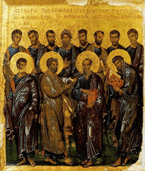Didache is the oldest known Christian text outside of the New Testament. Written around 90 AD, it the first in a series of works composed during the so-called “Apostolic Period”. Its English name, The Teaching of the Twelve Apostles, is more indicative of the content. This book is a collection of commentaries on the Catholic faith handed down by the Twelve Apostles to their episcopal successors and disciples. It is the most ancient example of a Catechism we possess. The beginning chapters summarize the “two ways”: the way of death and the way of life. The way of death is sourced in sin leading to misery through selfishness and superficiality. The way of life comes from Christ and His merciful love which frees us to be filled with His joy and peace. These are the only two ways of living; there is no middle road. Each person, regardless of their personal opinion about religion, chooses one of these paths. After elaborating on these two ways of life in the first 6 chapters of the book, the Apostles begin explaining how to obtain the “way of life” in chapter seven starting with the sacrament of Baptism. A proper Christian baptism must be made with water which is poured “thrice upon the head in the name of Father and Son and Holy Spirit.” The Holy Eucharist is discussed in chapter 9. What is most astounding about this text is its familiarity even to the contemporary Catholic. Anyone who practices their faith will immediately recognize this description from the chapter on the Eucharist: “Now in regards to Eucharist: take the cup and say, ‘We thank you, our Father, for the holy vine of David Your servant, which You made known to us through Jesus Your Servant; Blessed be God forever’…then take the bread and say, ‘We thank You, our Father, for the life and knowledge which You made known to us through Jesus Your Servant; Blessed be God forever’…” Here we see an exact representation of the Preparation of the Gifts. Even now, this same preparation is made every day during the celebration of Holy Mass. After elucidation on Baptism and the Eucharist, the Didache talks about the reception of new Christians (RCIA) as well as the hierarchical structure of the Church. It ends with a chapter on “watchfulness” exhorting every Christian to be pious, prayerful and devotional as we await the Second Coming of Christ. There is sometimes a debate about the origins of Catholic dogma. Some Protestants claim that many of the Church’s beliefs are “invented” and “not founded on the Bible”. But, in this ancient book we find the Twelve Apostles themselves celebrating Holy Mass recognizing a Church hierarchy and defending other Catholic teachings. I think we can trust they would not teach anything against Jesus Christ and the Sacred Scriptures.


